By Laurens Ikinia
As late South African President Nelson Mandela said: “Education is the most powerful weapon which you can use to change the world.” Papuan Governor Lukas Enembe also believes this.
Enembe made a remarkable decision to provide scholarships to Papuan students to obtain education overseas such as in New Zealand, Australia, the UK, the US and other countries across the world.
He has realised that having West Papuan students in many world ranking universities will help raise the profile and dignity of Papuans on the global stage.
This year, six Papuan provincial government scholarship recipients have graduated from several universities in New Zealand. About 160 Papuans are currently studying in New Zealand.
Marius Elabi graduated with Master of International Relationship and Security Studies from Waikato University on December 8, and Anggie Freesia Maritje Kapisa with a Bachelor of Science major in microbiology and Stephanie Verneytha Dike with a Bachelor of Science in Human Nutrition from Otago University on December 16.
Fredy Nawalyn with a Bachelor of International Business Management, Erli Enambere with a Bachelor of Contemporary International Studies and Prisilia Samori with a NZ Diploma in Tourism and Travel also graduated from the Institute of the Pacific United New Zealand on December 18.
Kapisa, who is the first child of her family to achieve education overseas said she was so humble and grateful to set an example for her younger sisters.
Even though Otago University did not hold its usual full graduation ceremony, a graduation ceremony was staged for Pacific students at the university campus.
Grateful for study opportunity
Kapisa said that she was so grateful to have a Pacific community at Otago University, so her West Papuan friends who were studying in New Zealand could come and celebrate the graduation together.
“I am so grateful to have my Pacific community here and West Papuan friends because my family could not attend my graduation,” said Kapisa.
Kapisa always stayed close to her family said that during her study she had encountered a lot of challenges knowing that came from a non-English speaking country and a different education system.
But with her commitment and perseverance and with the support from the people around her, she completed her study.
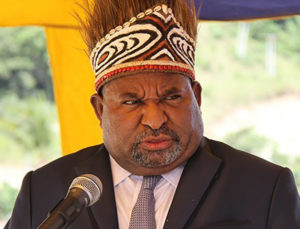
“Off course, I was homesick, but I must keep my health. It is not only my physical health but also my mental health,” she said.
“As you don’t know what I am going through, so it is important for me to have someone to talk to.
“I know that if I could make it, other girls can also make it,” said Kapisa.
Governor Enembe’s scholarships
Stephanie Verneytha Dike, who also graduated from Otago University, said she was extremely grateful to all the lecturers and academic supports staff who had helped her during her study.
She said she was so grateful to the government of Papua province and particularly Governor Enembe for granting her the scholarship to study in Aotearoa New Zealand.
Being an international student and studying overseas in a new environment and social life was always challenging, Dike said.
Dike who is also the first born in her family said that she faced a number of challenges that she managed to overcome.
She said the language barrier was the first challenge she faced along with social life.
Another challenge was the study because students were very competitive in class, so she had to study really hard.
“The challenges came from various factors, from education, the life like socialisation, and living far away from family – but the biggest challenge was competition in class,” she said.
‘Motivation to study hard’
“We have to pass the paper because we have the scholarship from the government, and we don’t want to waste the chance that the [Papua provincial] government has provided for us.
“Even though it is a pressure, we need to take it as our motivation to study hard,” said Dike.
Marius Elabi, who graduated from Waikato University, said that getting an opportunity to obtain knowledge from one of the universities in New Zealand was a fulfillment of his dream.
He said students needed to be grateful for the current provincial government’s programme to send students to pursue education in developed countries like New Zealand.
Elabi left his wife and children in West Papua and said it is really hard to be a student when you have got a family. But he was grateful to have a supportive family.
“I am so fortunate to have such a great wife and beautiful children who always get my back.
“My wife is a civil servant, but she is a great woman like other Melanesian and Pacific women,” he said.
“We West Papuans are capable to compete with other students here in New Zealand and in other countries, but we don’t have much opportunity,” said Elabi.
Father of three
Elabi, who is the father of three children, said that studying in New Zealand was not like in Indonesia where he had completed his undergraduate studies.
He said the challenges were similar to what Kapisa and Dike experienced, but one other issue that challenged him throughout his study was “family burdens”.
In order to be able to provide needs for his family back in West Papua, he did part time work as a cleaner and fruit picker.
“Even though I have to study and complete my thesis, I spent a couple of hours to do cleaning,” he said.
“During school break, I work with other West Papuan students at the farm.
“When you are students, never be shy to do any kind of work,” said Elabi.
Kapisa, Dike and Elabi said that they hoped the government of Papua province would send more Papuan students to New Zealand so that they could have a chance to know their brothers and sisters in the Pacific from New Zealand.
Presented achievements to family
The graduates said they presented their achievements to their mother, father, brothers, sisters, wife, children, extended family and all West Papuans.
Marveys Ayomi, a scholarship coordinator for Papuan students in New Zealand, said he was extremely proud of all the West Papuan graduates from Waikato, Otago and IPU New Zealand.
“First of all it is a big achievement for the people of Papua and we also need to acknowledge such an important role of the government of Papua plays from the very beginning since the establishment of the programme, specially a big thanks to our Governor bapak Lukas Enembe for providing this opportunity to many of our Papuan students.
“This is once in a lifetime opportunity for many of them and some of them in fact never travel out of Papua. Most of the students are highly motivated and driven to succeed.
“Now over the last three or four years we are averaging over five sometimes 10 students graduating over the last few years,” said Ayomi.
“This is the example of how successful the programme has been.”
Ayomi, a Papuan who has been living in New Zealand for 20 years and is a lecturer at the IPU New Zealand, said that there were many challenges that every student faced.
Adapting to new culture
Every student faced challenges like adapting to the new culture, academic system and other things.
Coming from Papua and culturally as a Melanesian and with a Pacific background, he said that New Zealand was a very unique and beautiful country for Papuans to be. He said in terms of the culture, there was a lot of similarity between Papuan culture and Māori culture.
“It is a different country, but I think culturally speaking we share a lot of commonalities and also similar cultural practices and traditions,” he said.
“The people of Papua have got a lot of hope for a bigger, better, brighter Papua in coming years. I call this day, the Golden Generation of Papua.”
He hopes everyone will succeed in their studies and enjoy their experience as much as possibly they can, take a lot of positive things that they can learn from New Zealand – “the beautiful nation and its people”.
Transfer some of those skills to your own people when you return home at some point,” said Ayomi.
“But if you still continue your studies, continue to do well and always put people in your land first before anything else.”
Laurens Ikinia is a Papuan Masters in Communication Studies student at Auckland University of Technology who has been studying journalism. He is on an internship with AUT’s Pacific Media Centre.
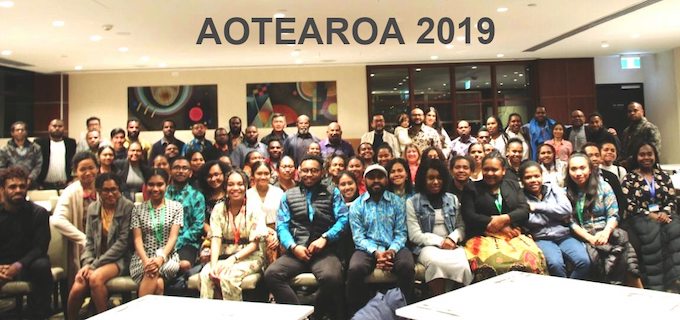
This post was originally published on Radio Free.
 Green Party MPs Marama Davidson and Teanau Tuiono (far right) attend a demonstration at parliament to mark the 59th anniversary of the day West Papuans first raised their nationalist Morning Star flag. 1 December, 2020. Image: Johnny Blades/RNZ Pacific
Green Party MPs Marama Davidson and Teanau Tuiono (far right) attend a demonstration at parliament to mark the 59th anniversary of the day West Papuans first raised their nationalist Morning Star flag. 1 December, 2020. Image: Johnny Blades/RNZ Pacific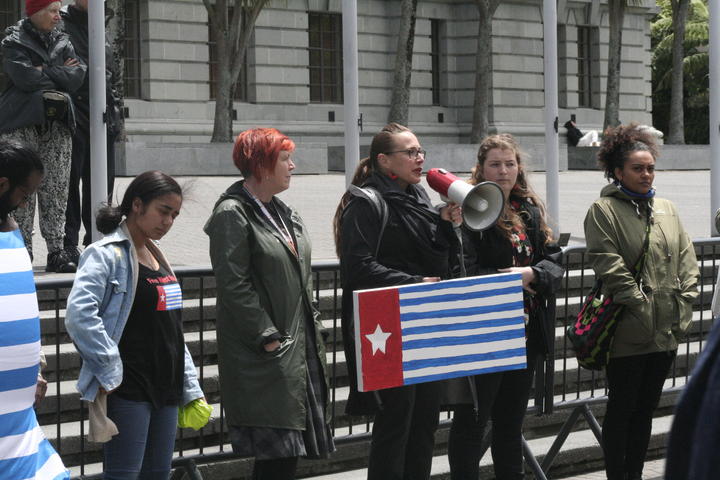 April Henderson speaks at the annual December 1 Flag Day demonstration in support of West Papuan independence. 1 December, 2020. Image: Johnny Blades/RNZ Pacific
April Henderson speaks at the annual December 1 Flag Day demonstration in support of West Papuan independence. 1 December, 2020. Image: Johnny Blades/RNZ Pacific
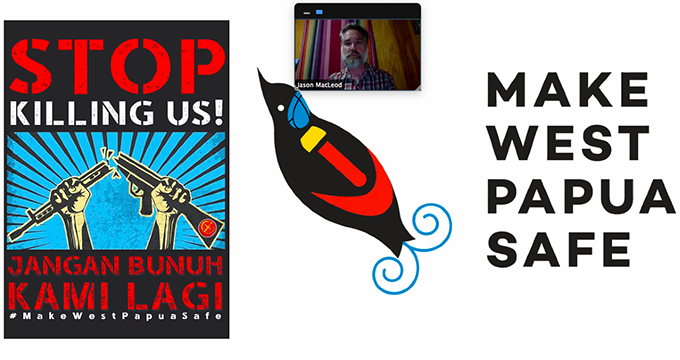
 The Make West Papua Safe logo … campaign against Indonesian militarism. Image: PMC screenshot
Yohanes Mambrasar, a West Papuan lawyer gave an illuminating description on what has been happening over human rights violence by state institutions towards indigenous people of West Papua.
“There has been increasing repression. We are seeing violent actions by the TNI (Indonesian National Armed Forces) and police against unarmed peaceful civilians who are gathering to express their political aspirations. We can really see this increasing year by year, even month by month,” said Mambrassar.
Human rights advocacy
Mambrassar who has been working on human rights advocacy said that during 2019 and 2020 “we are seeing this crackdown on protesting West Papuans.”
But they were also seeing a lot of violence towards villagers, who were suspected of supporting independence or having “separatist sympathies”, such as in Nduga, Intan Jaya, and other regions.
He said the violence was now extended to the virtual world where some people who disseminated information on social media such as Facebook and YouTube would face cyber-attacks. They were even physically attacked by the police or armed forces.
The Make West Papua Safe logo … campaign against Indonesian militarism. Image: PMC screenshot
Yohanes Mambrasar, a West Papuan lawyer gave an illuminating description on what has been happening over human rights violence by state institutions towards indigenous people of West Papua.
“There has been increasing repression. We are seeing violent actions by the TNI (Indonesian National Armed Forces) and police against unarmed peaceful civilians who are gathering to express their political aspirations. We can really see this increasing year by year, even month by month,” said Mambrassar.
Human rights advocacy
Mambrassar who has been working on human rights advocacy said that during 2019 and 2020 “we are seeing this crackdown on protesting West Papuans.”
But they were also seeing a lot of violence towards villagers, who were suspected of supporting independence or having “separatist sympathies”, such as in Nduga, Intan Jaya, and other regions.
He said the violence was now extended to the virtual world where some people who disseminated information on social media such as Facebook and YouTube would face cyber-attacks. They were even physically attacked by the police or armed forces.
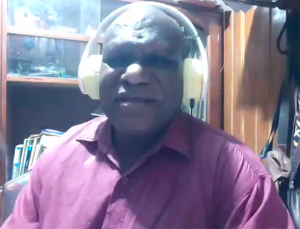 Church advocate Yones Douw … “right through until today the violence has continued.” Image: PMC screenshot
However, Yones Douw, head of the justice and peace department of KIMI church (West Papua Kemah Gospel Church), said that violence had never stopped since Indonesia had occupied West Papua.
“Really the violence has not changed since 1961 to 1969, 1969 to 2020, and 2020, when special autonomy was declared here in West Papua – right through until today the violence has continued,” said Douw.
Douw, a human rights activist, said that when special autonomy was introduced, Jakarta said that West Papuans would be 90 percent independent.
Promises ‘only words’
He said this was “only words – in fact, we have been seeing increasing violence”.
“So, if special autonomy went the way it was supposed to, West Papuan people should be protected and cared for. But that has not happened at all,” Douw said.
“Why is [the violence] increasing like this? Well, if you find a pastor who is speaking about the suffering of his congregation, he will be called a separatist. Anyone who speaks about human rights will be called as separatist, anyone who speaks about the welfare of Papuan people will be labelled as separatist,” he said.
He said that the Indonesian laws granting freedom of expression did not hold in West Papua. Even journalists, human rights activists, and some church leaders could not work without feeling a sense of fear.
“These are school students who are being shot, these are student who are walking around their own villages and without even any question they are being shot.
“Imagine what it is like if you are an older person, there is just no freedom at all to move,” said Douw.
Church advocate Yones Douw … “right through until today the violence has continued.” Image: PMC screenshot
However, Yones Douw, head of the justice and peace department of KIMI church (West Papua Kemah Gospel Church), said that violence had never stopped since Indonesia had occupied West Papua.
“Really the violence has not changed since 1961 to 1969, 1969 to 2020, and 2020, when special autonomy was declared here in West Papua – right through until today the violence has continued,” said Douw.
Douw, a human rights activist, said that when special autonomy was introduced, Jakarta said that West Papuans would be 90 percent independent.
Promises ‘only words’
He said this was “only words – in fact, we have been seeing increasing violence”.
“So, if special autonomy went the way it was supposed to, West Papuan people should be protected and cared for. But that has not happened at all,” Douw said.
“Why is [the violence] increasing like this? Well, if you find a pastor who is speaking about the suffering of his congregation, he will be called a separatist. Anyone who speaks about human rights will be called as separatist, anyone who speaks about the welfare of Papuan people will be labelled as separatist,” he said.
He said that the Indonesian laws granting freedom of expression did not hold in West Papua. Even journalists, human rights activists, and some church leaders could not work without feeling a sense of fear.
“These are school students who are being shot, these are student who are walking around their own villages and without even any question they are being shot.
“Imagine what it is like if you are an older person, there is just no freedom at all to move,” said Douw.
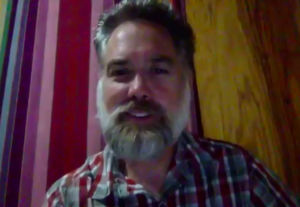 Author Jason MacLeod … responding to students’ “go to hell” message to the Australian and New Zealand governments. Image: PMC screen shot
Stopping foreign support
Jason MacLeod, co-founder of Make West Papua Safe, said he had collaborated with New Zealand activist Maire Leadbeater and Rosa Moiwend in launching this campaign.
The campaign was “to stop foreign government support for the Indonesian police and military,” said MacLeod.
He said it was a peaceful movement seeking to stop New Zealand and Australian government funding and training for the Indonesian police and military which every day brutally repressed the indigenous people of West Papua.
Brisbane-based MacLeod, who has been working on West Papua issues for the last 30 years, said the motivation behind the founding of the Make West Papua Safe campaign was in response to students speaking out in Jayapura.
Asked what they had thought about the New Zealand and Australian governments’ help for the Indonesian military, the students replied that both governments “can go to hell”, said MacLeod.
The activists, lawyers, and human rights defenders called on the people in Australia, New Zealand, United Kingdom, United States, the Pacific, Africa, Caribbean, Europe and Asia to raise their voices support of stopping military oppression in West Papua.
Contributed by a postgraduate communication studies student at Auckland University of Technology.
Author Jason MacLeod … responding to students’ “go to hell” message to the Australian and New Zealand governments. Image: PMC screen shot
Stopping foreign support
Jason MacLeod, co-founder of Make West Papua Safe, said he had collaborated with New Zealand activist Maire Leadbeater and Rosa Moiwend in launching this campaign.
The campaign was “to stop foreign government support for the Indonesian police and military,” said MacLeod.
He said it was a peaceful movement seeking to stop New Zealand and Australian government funding and training for the Indonesian police and military which every day brutally repressed the indigenous people of West Papua.
Brisbane-based MacLeod, who has been working on West Papua issues for the last 30 years, said the motivation behind the founding of the Make West Papua Safe campaign was in response to students speaking out in Jayapura.
Asked what they had thought about the New Zealand and Australian governments’ help for the Indonesian military, the students replied that both governments “can go to hell”, said MacLeod.
The activists, lawyers, and human rights defenders called on the people in Australia, New Zealand, United Kingdom, United States, the Pacific, Africa, Caribbean, Europe and Asia to raise their voices support of stopping military oppression in West Papua.
Contributed by a postgraduate communication studies student at Auckland University of Technology.